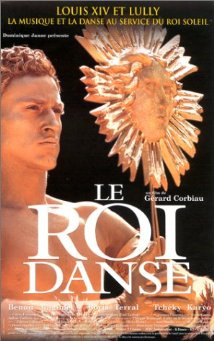The King Is Dancing
This article needs additional citations for verification. (June 2019) |
| Le Roi danse | |
|---|---|
 | |
| Directed by | Gérard Corbiau |
| Written by | Marcel Beaulieu Andrée Corbiau Gérard Corbiau Ève de Castro Didier Decoin |
| Starring | Benoît Magimel Boris Terral Tchéky Karyo |
| Cinematography | Gérard Simon |
| Edited by | Philippe Ravoet Ludo Troch |
Release dates |
|
Running time | 115 minutes |
| Countries | France Germany Belgium |
| Language | French |
The King is Dancing (Le Roi danse) is a 2000 costume drama by Belgian filmmaker Gérard Corbiau based on Philippe Beaussant's biography of Jean-Baptiste Lully, Lully ou le musicien du soleil (1992). The film, presenting libertine and pagan Lully as a natural ally of the early Enlightenment figure Louis XIV of France in his conflicts with the Catholic establishment, focuses on Lully's personal relationship with the King, as well as his camaraderie with Molière and rivalry with Robert Cambert.
Plot[edit]
Lully (Boris Terral) starts to gain the favour of the 14-year-old King Louis in 1653 by giving him specially designed shoes for Ballet Royal de la Nuit. His subsequent rise draws hostility from the old cadres of the court, particularly the royal composer Cambert (Johan Leysen).
Following Cardinal Mazarin's death, Louis (Benoît Magimel) installs himself in full power as the king in 1661. He is now at stake with the religious establishment created and controlled by his mother Anne of Austria (Colette Emmanuelle) at the Palais-Royal. On the other hand, Lully's animosity with Cambert comes to a novel dimension after Cambert's mistress Madeleine Lambert (Cécile Bois), the daughter of Michel Lambert, marries Lully in 1662.
Lully and another Versailles favourite, Molière (Tchéky Karyo), are keen to further disarm the old court. The duo get to understand their own limitations when conflict becomes more manifest at events such as the staging (and consequent ban) of Tartuffe in 1664. Meanwhile, the passing years bring an end to Lully's position as the king's dance teacher and choreographer and he also has to face the emotional tensions growing with his wife's niece Julie (Claire Keim), which will culminate at the gala of Cambert's Pomone in 1671.
Cast[edit]
- Benoît Magimel as Louis XIV
- Boris Terral as Jean-Baptiste Lully
- Tchéky Karyo as Molière
- Johan Leysen as Robert Cambert
- Cécile Bois as Madeleine Lambert
- Claire Keim as Julie
- Idwig Stéphane as Prince de Conti
- Caroline Veyt as Armande Béjart
- Ingrid Rouif as Madame de Montespan
- Jacques François as Jean de Cambefort
- Pierre Gérald as Jean-Baptiste Boësset
- Vincent Grass as Archbishop of Paris
- Jean-Louis Sbille as Spectator
- Colette Emmanuelle as Anne of Austria
- Serge Feuillard as Cardinal Mazarin
Production[edit]
The film was shot on location at Versailles, as well as in other locations in France, Germany and Belgium. Sets for the film were built at MMC Studios in Cologne.
External links[edit]
- 2000 films
- 2000s historical films
- 2000s biographical drama films
- French historical drama films
- French biographical drama films
- Belgian historical drama films
- German historical drama films
- Films directed by Gérard Corbiau
- Films about classical music and musicians
- Films about composers
- Biographical films about musicians
- Films about Louis XIV
- Films set in 1653
- Films set in 1661
- Films set in 1662
- Films set in 1664
- Films set in 1671
- Cultural depictions of Molière
- Cultural depictions of Cardinal Mazarin
- Cultural depictions of classical musicians
- French-language Belgian films
- 2000s French-language films
- Belgian biographical drama films
- German biographical drama films
- 2000s French films
- 2000s German films
- Cultural depictions of Anne of Austria
- Biographical film stubs
- 2000s French film stubs
